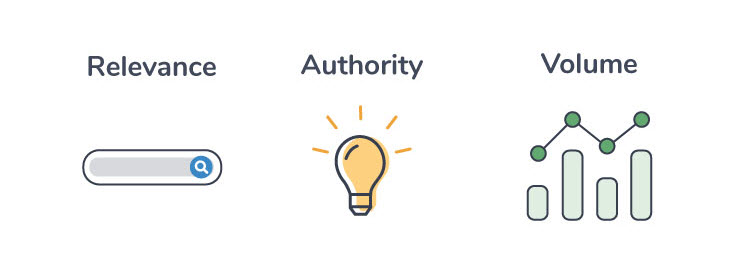Table of Contents
- Importance of Keyword Research in SEO
- Defining Your Target Audience in SEO
- Analyzing and Selecting Keywords in SEO
- Competitor Keywords Analysis in SEO
- Role of Keyword Research Tools in SEO
Importance of Keyword Research in SEO
The foundation of all digital marketing is keyword research. This research informs content and organic strategy, which contributes to a higher ranking on search engine results pages (SERPs), builds online credibility, and attracts your target audience.
Keyword research is the process of discovering relevant search terms that your audience is searching for on a search engine such as Google. This helps you identify topics to cover and create relevant content.
Using the right keywords will boost your website’s traffic and conversion rate.
Key Facts About Keyword Research
The first step in keyword research is to determine the monthly search volume and competitiveness for a given keyword. Then, use these factors to determine if it’s worth optimizing for.
Understanding Searcher Intent
The most important aspect of keyword research is to understand what your audience is searching for. This can be done through keyword research or by listening to your customers.
Long-Tailed Keywords and Topic Targeting
Another key aspect of keyword research is to focus on topics that your audience cares about. This is a great way to get in front of the right people with less effort.

Defining Your Target Audience in SEO
Identifying your target audience is one of the most important tasks in search engine optimization (SEO). Understanding your customers can help you create data-driven, highly personalized messaging that will improve your ROI and drive brand loyalty.
To determine your target audience, start with the visitors to your website and analyze their habits. Look at their age range, gender, location, device type, referring URL, and more.
Use this information to develop a strategy to reach your audience. This may include creating more relevant content, promoting your social media presence more frequently, or providing other value to your visitors.
You can also use Google Analytics to find out how they are interacting with your site.
If you’re a restaurant chain, for example, you might find that many of your guests are families with children under six years old. Identifying this group as your target audience will help you understand what type of content they enjoy and how to make it more relevant.
Taking a close look at your competitors’ audiences is another excellent way to find your ideal market. Compare their websites to yours and see how they are similar and different.
Defining your audience is a crucial step for your SEO campaign, and will ultimately benefit your business in the long run. By identifying who your ideal customer is, you can build relationships with them and create marketing that resonates. This can increase your ROI and boost brand loyalty, a win-win for both parties!

Analyzing and Selecting Keywords in SEO
One of the most important parts of any search engine optimization (SEO) campaign is keyword research. This process involves identifying what keywords potential customers are searching for and incorporating those into your content to improve your website’s visibility in search engines like Google.
Before you start keyword research, make sure to understand your business’s goals and target audience. This will help you narrow down your list of keywords and prioritize where to invest your time and resources.
Use tools to help
When you’re conducting keyword research, it’s crucial to use tools that will allow you to compare and contrast your keywords against competitors. This will give you a better idea of how much effort it would take to rank for each keyword, as well as what kind of traffic it could bring.
Identify the user’s intent
When users search on Google, they are looking for information and products that can meet their needs. By understanding their intent, you can create the content that matches their needs and help them move through your conversion funnel.
Analyze your search volume and trends
When analyzing your keyword search volumes, it’s important to understand how frequently people are using the keywords. This will let you know if the search volume is worth the effort it will take to get your content listed on the first page of SERPs.

Competitor Keywords Analysis in SEO
Keywords are important for any online business because they help you reach your target audience naturally. A keyword strategy helps your website rank higher in search engine results pages (SERPs) and increase the amount of traffic to your site.
Competitor Keywords Analysis in SEO
Competitor keywords analysis can help you identify what your competitors are targeting and how they are using them to gain a competitive advantage over your website. It can also reveal opportunities that you may have overlooked in your search strategy.
A good competitor keyword research tool can help you find the right keywords to target and make sure they are relevant to your business. It will also show you how many other websites are already ranking for the same terms and provide a range of information about them.
The Role of Keyword Research Tools in SEO
The first step of search engine optimization (SEO) is to find the words and phrases that customers are searching for online. Using keywords that align with your brand, products, and services can drive traffic to your website.
When choosing keywords, it’s important to consider how much demand there is for a particular term. If there’s little demand, it will be hard to generate traffic from these terms.
Luckily, there are several tools available that can help you find keywords that are popular among your target audience. These tools can show you monthly search volume, keyword trends, and competition.
These tools can also help you identify seed keywords and long-tail keywords that you can use to improve your content strategy. Whether you’re creating a new blog post, or planning a new landing page, keyword research is essential for driving traffic to your site.
Having the right keywords is essential for making sure that you have enough search visibility and are found in the first few pages of Google. Without these foundational keywords, your digital marketing strategy will fail.





